Stoves that Save

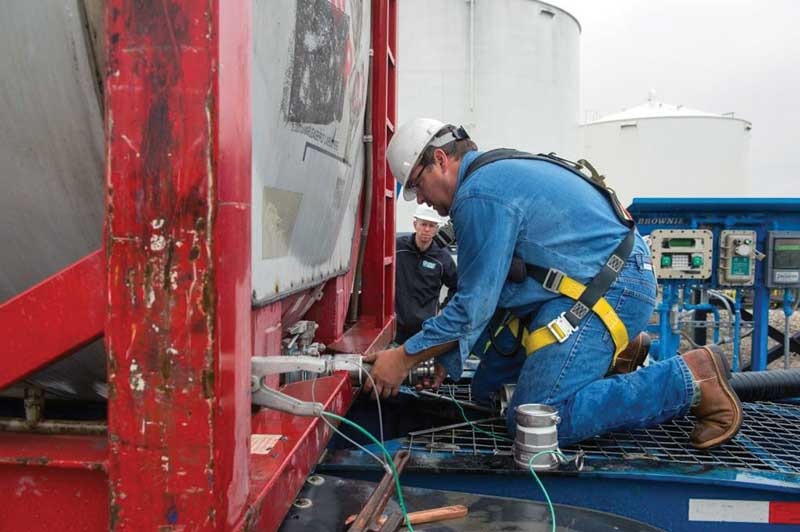
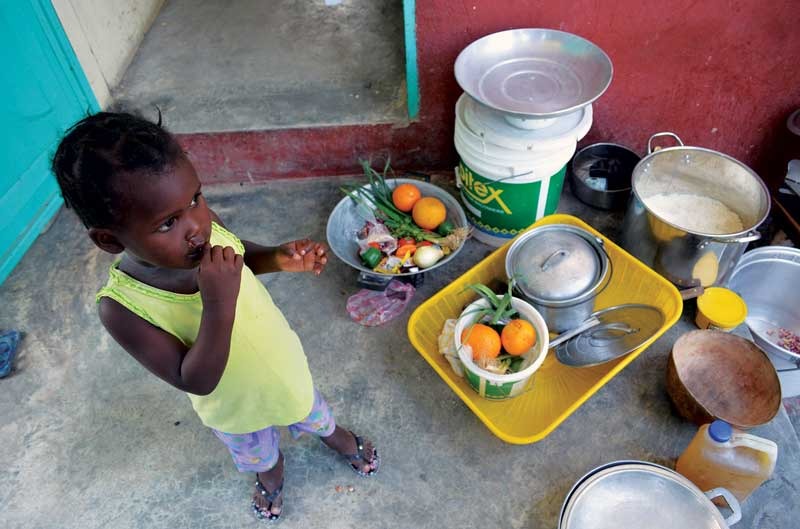
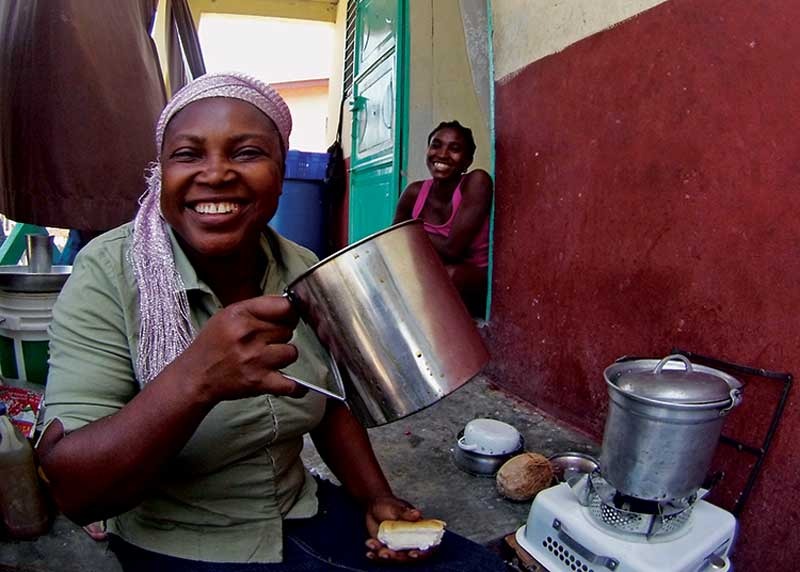
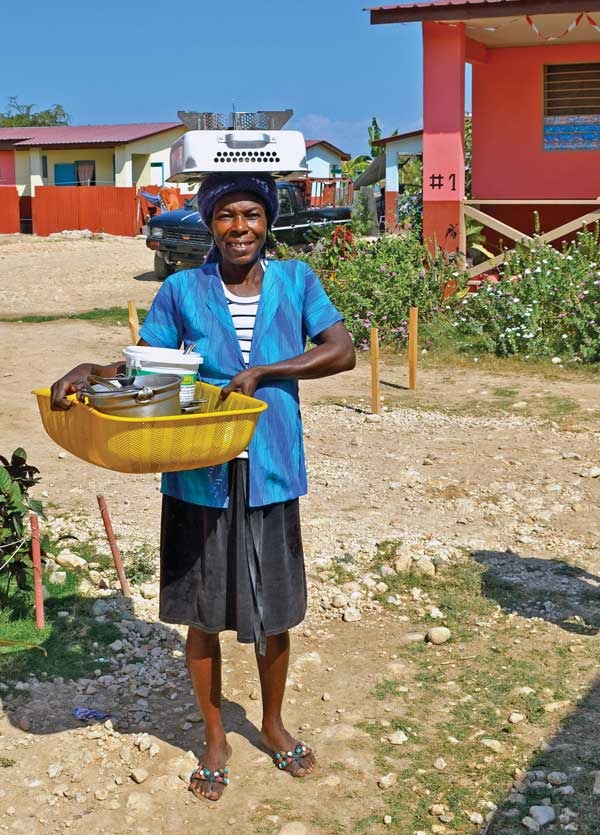
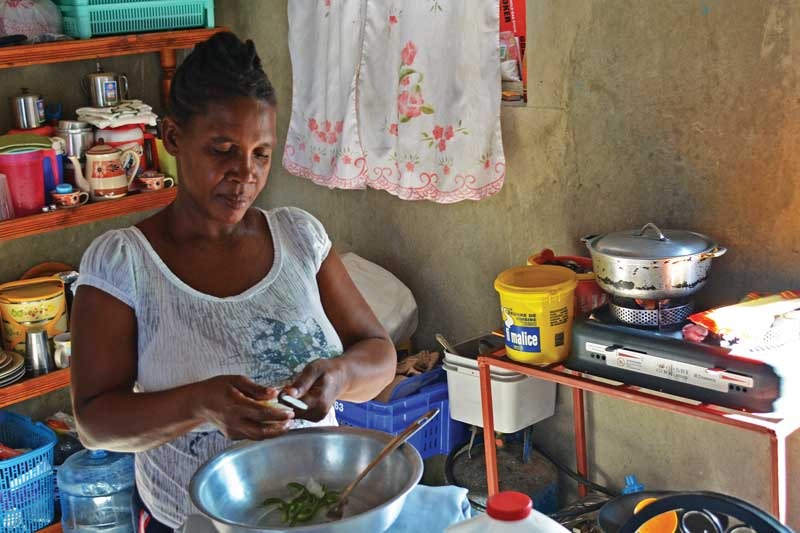
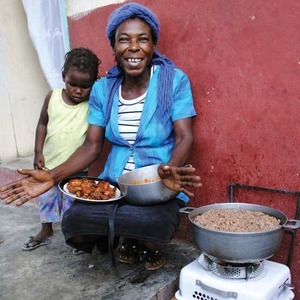
PHOTO: PROJECT GAIA
June 1, 2015
BY Janna Farley
Decades ago, Haiti was a popular stop for luxury cruise liners. The country’s tropical weather, miles of beautiful Caribbean coasts and a rich history (not to mention the rum) enticed tourists to explore the island.
Fast forward to today. Deforestation and pollution have distressed the country’s environment and beauty. The chronic effects of disease, economic instability and social unrest, coupled with the infrastructure devastation from the 2010 earthquake, have positioned Haiti among the poorest countries in the world. The extreme poverty makes life on the island hard, particularly when it comes to meeting one of life’s basic needs: food. Not only do Haitians have to worry about where their next meal is coming from. They also have to worry about how to cook it.
“Cooking is something that most of us here in the United States do all the time without even thinking twice about it,” says Brady Luceno, assistant director for Project Gaia, a Gettysburg, Pennsylvania-based nonprofit organization dedicated to promoting and implementing projects based around clean cookstoves powered by alcohol fuels.
Haitians, however, like many people in developing countries, cook over open fires, using solid fuels such as charcoal, wood and other biomass substrates. But wood and charcoal are expensive and often hard to get. “People are suffering because they can’t afford to cook their daily meals,” Luceno says. Not to mention that burning these solid fuels is bad for the environment—and the residual smoke and carcinogens are bad for people’s health. “It’s gotten to the point where we’ve reached a crisis,” Luceno says. “Something has to change.”
The solution could be found in a very familiar substance—ethanol. And if all goes as planned, it not only will help fight pollution and deforestation in Haiti, but also stimulate and revive the Haitian economy. That’s where Poet LLC, one of the nation’s largest producers of ethanol, comes in. Through a new partnership with Project Gaia, Poet hopes to help replace wood-burning stoves in Haiti with clean, ethanol-fueled cook stoves.
For decades, ethanol has been used in the United States primarily as an automotive fuel. But as good as it is for cars, ethanol is an even better home cooking fuel, says Shon Van Hulzen, director of quality control for Poet plant management in Sioux Falls, South Dakota. “The characteristics of ethanol as a fuel and its combustion chemistry make it an ideal home cooking fuel,” he says. “Ethanol is safe to handle from both a toxicity and flammability standpoint, and the emissions from burning ethanol are virtually nonexistent, with the primary combustion byproducts being simply carbon dioxide and water vapor.”
To jump-start the project, Poet donated 12,000 gallons of ethanol, shipping two loads from its production site in Jewell, Iowa, to Port-au-Prince, Haiti. The first rollout of stoves and fuel began earlier this year. A couple hundred stoves have been distributed so far.
Haitians are excited about the possibilities these cookstoves hold, Luceno says, and are thrilled with the speed of cooking. “One of the first users said she would have had to wake up at 5 a.m. to light her charcoal stove to make coffee in the morning. Now, she only needs 10 minutes.”
But more than saving time, Haitians will be saving money. “We found that in Haiti, people were spending 56 cents to cook one meal because of the fuel cost,” Luceno says. “It’s our hope that with ethanol, they’ll be able to cook more meals with the same amount of money.”
Abounding Benefits
The benefits don’t stop there. Improved cooking conditions will also help improve Haitians’ health. Household air pollution—essentially kitchen smoke resulting from burning wood and charcoal indoors—“is the silent killer in the kitchen,” Luceno says. The United Nations estimates that the average lifespan in Haiti is shortened by 6.6 years due to illnesses caused by household air pollution.
The use of ethanol as a cooking fuel also stands to help the environment. The nation has experienced extreme deforestation over the years, and now less than 2 percent of Haiti’s forest cover remains. Alternative cooking fuels, like ethanol, will help put an end to that, Luceno says.
But ethanol’s potential as a cooking fuel in Haiti goes far beyond the family meal. And that’s what makes the project so exciting, Luceno says. “The stoves themselves are not the solution,” she says. “They merely provide the spark.” Ethanol could be just what Haitians need to stimulate their economy. The country of Haiti is testimony to the fact that you cannot give people out of poverty. Despite the best intentions of hundreds of nonprofit organizations and millions of donated dollars, the country of Haiti has made very little progress toward sustaining its own people. “Economic opportunity is what they need, not another handout,” Van Hulzen says.
As more Haitians start using the cookstoves, there will be a bigger market for ethanol in the country. Ethanol imported from the United States will help meet that demand for the home-cooking fuel. But eventually, Haitians could produce their own. “Ethanol offers perhaps the greatest opportunity to revitalize the agriculture sector and offer families a clean and affordable alternative to charcoal,” Luceno says. “Haiti was once a leading alcohol-producing nation but currently produces only a fraction of its potential. Those sugar cane mills and alcohol distilleries represent a ready infrastructure for a clean energy future. If ethanol were produced there, it could be cost-competitive with charcoal, kerosene and liquid petroleum gas.” This kind of socioeconomic development is the most effective way to teach a man to fish, or, more aptly, to “give a man a market,” Van Hulzen says.
“This creates a viable market for clean burning ethanol in Haiti and, in addition, a viable agriculture market Haitians can take advantage of in the future,” says Jeff Broin, founder and executive chairman of Poet. “If agriculture can regain a foothold by producing sugarcane, corn and other crops for cooking fuel, we can do even more than improve health and deforestation issues in Haiti. We can literally see people pull themselves out of poverty.”
It won’t happen overnight. “Developing an economy takes time. It takes a long-term vision and an unwavering commitment to make it happen,” Van Hulzen says. “But it’s worth the investment as it is arguably the only method of creating a sustainable country.”
Haiti is just the beginning. The potential for ethanol to be used as a home-cooking fuel extends to many other countries around the world. “It’s a wonderful project that a lot of us here are rallying around,” Van Hulzen says. “We used Haiti initially as a test site to see if we could get a product flowing, to get a market developed. Now we’re looking at other geographies.”
African countries, such as Kenya, are on the list, Van Hulzen says. Project Gaia estimates that if every home in Africa, developing Asia, Latin America and the Middle East that is currently using traditional solid fuels would switch to ethanol fuel for cooking, the resulting demand would be more than 27 billion gallons of ethanol annually. “That’s almost exactly double the entire United States market today,” Van Hulzen says. “It’s a huge market.”
It’s projects like these that illustrate, as the people of Poet believe, that ethanol is more than just an automotive fuel. “It’s something that literally changes lives,” Broin says, “whether that’s a farmer who has a new market for grain, a city with air quality issues that needs a cleaner-burning fuel or, in this case, a woman in Haiti who wants to cook dinner for her family without fouling the air she and her husband and children breathe.”
Related Projects
It isn’t the first time Poet has worked to improve lives in Africa.
A project dubbed Mission Greenfield is improving the lives of farmers in rural Kenya. When Broin took part in a church mission trip to Kenya, he was struck by how bad the local corn crop appeared. A drought factored into the problem. But Broin also determined that traditional farming practices were starving the crop of nutrients and moisture.
Land in Africa is traditionally hoed by hand. Because there’s no freeze-thaw cycle there, there’s a hard pan below the topsoil that’s probably been there for hundreds of years. So the roots would simply spread out when they hit the hardpan, and in periods of dry weather, it could cause a poor to no yield. Broin and a charitable foundation set up by Poet found a local partner, FIPS (Farm Input Promotions) Africa to help teach African farmers new farming, tillage and fertilization techniques.
In addition, Poet also supports Mission Greenhouse, a multiyear project to grow a school for disadvantaged girls in Kenya.
Author: Janna Farley
South Dakota-based freelance writer
janna.farley@gmail.com
605-366-7732
Advertisement
Advertisement
Advertisement
Advertisement
Related Stories
SAF Magazine and the Commercial Aviation Alternative Fuels Initiative announced the preliminary agenda for the North American SAF Conference and Expo, being held Sept. 22-24 at the Minneapolis Convention Center in Minneapolis, Minnesota.
Saipem has been awarded an EPC contract by Enilive for the expansion of the company’s biorefinery in Porto Marghera, near Venice. The project will boost total nameplate capacity and enable the production of SAF.
Global digital shipbuilder Incat Crowther announced on June 11 the company has been commissioned by Los Angeles operator Catalina Express to design a new low-emission, renewable diesel-powered passenger ferry.
International Air Transport Association has announced the release of the Sustainable Aviation Fuel (SAF) Matchmaker platform, to facilitate SAF procurement between airlines and SAF producers by matching requests for SAF supply with offers.
Alfanar on June 20 officially opened its new office in London, further reaffirming its continued investment in the U.K. The company is developing Lighthouse Green Fuels, a U.K.-based SAF project that is expected to be complete in 2029.
Upcoming Events










